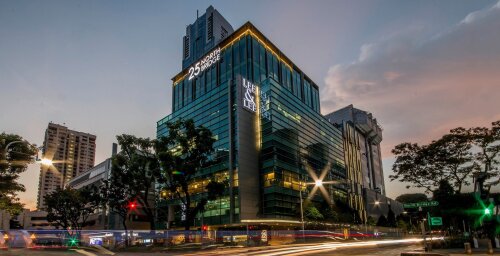Best Art & Cultural Property Law Lawyers in Singapore
Share your needs with us, get contacted by law firms.
Free. Takes 2 min.
Or refine your search by selecting a city:
List of the best lawyers in Singapore
About Art & Cultural Property Law in Singapore
Art & Cultural Property Law in Singapore is a specialized field that deals with the protection, regulation, and management of art and cultural property. This branch of law involves a range of issues, including the ownership, transfer, and restitution of artworks and cultural heritage. Singapore's legal framework is designed to support art preservation, facilitate the flourishing of cultural heritage, and adhere to international conventions that the nation is part of, such as the UNESCO 1970 Convention on the Means of Prohibiting and Preventing the Illicit Import, Export, and Transfer of Ownership of Cultural Property.
Why You May Need a Lawyer
Legal assistance in Art & Cultural Property Law may be necessary in various situations, including:
- Acquiring or selling art where clear provenance needs to be established to avoid disputes or potentially illegal transactions.
- Dealing with disputes over the authenticity or ownership of artworks and cultural items.
- Understanding and complying with export or import restrictions on cultural artifacts.
- Navigating bequests or donations of art and cultural property to museums or other institutions, including tax implications.
- Addressing issues related to the illegal trade or restitution of artworks, which may have been looted or improperly acquired.
Local Laws Overview
Key local laws in Singapore relevant to Art & Cultural Property include:
- National Heritage Board Act: Governs the management and protection of national heritage, including art and historical monuments.
- Import and Export Act: Provides regulations concerning the import and export of goods, including cultural property.
- Copyright Act: Protects the intellectual property rights of artists, covering the reproduction and usage of their works.
- Penal Code: Addresses offenses related to theft and illegal dealings pertaining to art and cultural property.
These laws work together to ensure a comprehensive system for managing and safeguarding the cultural property within Singapore's jurisdiction.
Frequently Asked Questions
What is considered cultural property in Singapore?
Cultural property in Singapore includes tangible heritage such as artworks, antiques, manuscripts, and buildings with historical significance.
Can I legally export antique items from Singapore?
Exporting antique items may require a permit, especially if they are considered national treasures. The specific regulations will depend on the item's value and cultural significance.
How can I verify the authenticity of an artwork?
To verify artwork, consider consulting art experts, provenance research, and scientific analysis. Provenance documents and certifications from reputable appraisers are critical in this process.
What should I do if I suspect an artwork is stolen?
Immediately report your suspicions to the local authorities and consult with a lawyer specializing in art law to understand your legal options.
Are there penalties for violating cultural property laws?
Yes, there are significant penalties, including fines and potential imprisonment, for violating cultural property laws through illegal transactions, theft, or failure to comply with export/import regulations.
How is intellectual property related to art law?
Intellectual property (IP) law protects the rights of artists concerning their creations. It governs copyright, moral rights, and other IP issues relating to artistic works.
What role do museums play in cultural property law?
Museums are custodians of cultural property, responsible for proper documentation, preservation, and legal acquisitions. They also have a role in returning looted or misappropriated items.
How do international laws affect art law in Singapore?
International conventions, such as the UNESCO 1970 Convention, influence local policies and regulations regarding the import, export, and restitution of cultural property.
What is the role of an art dealer in ensuring legal compliance?
Art dealers must ensure that transactions comply with local and international laws, maintain accurate provenance records, and avoid dealing in stolen or looted items.
How can artists protect their creative rights?
Artists can protect their rights by registering their works, using licensing agreements, and enforcing their IP rights through legal channels when necessary.
Additional Resources
For those seeking further information and assistance, the following resources may be helpful:
- National Heritage Board: Provides resources on heritage preservation and regulations concerning cultural property.
- Singapore Art Museum: Offers insights into the management of art collections and legal aspects related to art exhibitions.
- Singapore Intellectual Property Office (IPOS): A key resource for understanding intellectual property rights related to artistic works.
- Law Society of Singapore: Can help in finding accredited lawyers specializing in art and cultural property law.
Next Steps
If you require legal assistance in Art & Cultural Property Law, consider the following steps:
- Consult legal practitioners with expertise in art law and cultural property to understand the legal options available.
- Gather all relevant documentation and evidence related to your case, such as provenance records, bills of sale, or correspondence.
- Consider mediation or alternative dispute resolution for conflicts that might not need formal court procedures.
- Reach out to relevant bodies like the National Heritage Board or IPOS for preliminary guidance and support.
- Stay informed about your rights and obligations under Singapore law and any relevant international treaties.
With proper guidance and knowledgeable legal assistance, navigating the complexities of Art & Cultural Property Law in Singapore can be made significantly easier.
Lawzana helps you find the best lawyers and law firms in Singapore through a curated and pre-screened list of qualified legal professionals. Our platform offers rankings and detailed profiles of attorneys and law firms, allowing you to compare based on practice areas, including Art & Cultural Property Law, experience, and client feedback.
Each profile includes a description of the firm's areas of practice, client reviews, team members and partners, year of establishment, spoken languages, office locations, contact information, social media presence, and any published articles or resources. Most firms on our platform speak English and are experienced in both local and international legal matters.
Get a quote from top-rated law firms in Singapore — quickly, securely, and without unnecessary hassle.
Disclaimer:
The information provided on this page is for general informational purposes only and does not constitute legal advice. While we strive to ensure the accuracy and relevance of the content, legal information may change over time, and interpretations of the law can vary. You should always consult with a qualified legal professional for advice specific to your situation.
We disclaim all liability for actions taken or not taken based on the content of this page. If you believe any information is incorrect or outdated, please contact us, and we will review and update it where appropriate.
Browse art & cultural property law law firms by city in Singapore
Refine your search by selecting a city.















